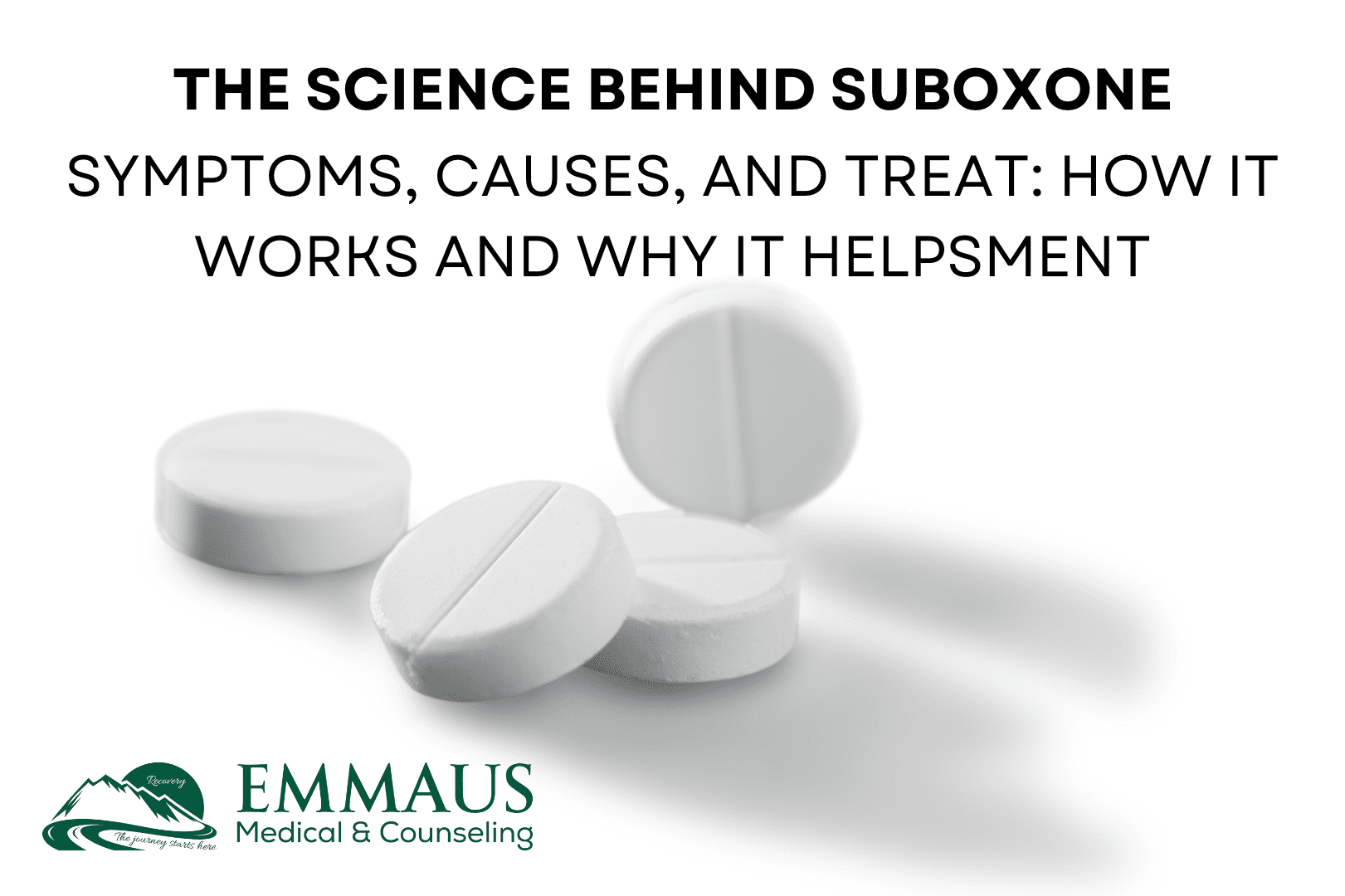Opioid addiction remains a major public health concern, and effective treatment requires combining medical, psychological, and social support. Suboxone treatment in Tennessee has become one of the most effective approaches to helping individuals break free from opioid dependence. At Emmaus Medical & Recovery, we see every day how Suboxone provides stability, reduces cravings, and helps patients rebuild their lives.
What Is Suboxone?
Suboxone is a combination medication that includes buprenorphine, a partial opioid agonist, and naloxone, an opioid blocker.
- Buprenorphine attaches to the brain’s opioid receptors but activates them only slightly—enough to reduce withdrawal symptoms and cravings without delivering the intense “high” of full opioids.
- It has a ceiling effect, meaning higher doses do not create stronger effects, which significantly lowers the risk of misuse or overdose.
- Naloxone is added specifically to deter misuse; it remains inactive when Suboxone is taken correctly, but triggers withdrawal if someone attempts to misuse it.
Together, these components make Suboxone both safe and highly effective for treating opioid dependency.
How Suboxone Works: The Mechanisms
Reducing Cravings and Withdrawal
Buprenorphine helps reduce cravings and stabilizes the body during withdrawal. Its strong receptor affinity also blocks other opioids, which helps prevent relapse.
Preventing Misuse
Naloxone acts as a safeguard. If Suboxone is misused by injection, naloxone blocks the opioid effects and induces sudden withdrawal, discouraging misuse.
Safety and Overdose Protection
Thanks to the ceiling effect, Suboxone is safer than full opioids and significantly reduces the risk of overdose when taken as prescribed.
The Evidence: Why Suboxone Helps
Improved Outcomes and Quality of Life
People who engage in Suboxone treatment in Tennessee are more likely to remain in treatment, reduce illicit opioid use, and rebuild relationships and stability in their lives.
Lower Overdose Risk
Research shows that Suboxone reduces the risk of fatal overdoses, making it one of the most important tools in opioid recovery.
Comparable Effectiveness
Compared with other forms of MAT, Suboxone is highly effective and often easier to start, since it doesn’t require complete detox before treatment begins.
Debunking the Myth: “Trading One Addiction for Another”
A common misconception is that Suboxone simply replaces one addiction with another. This is not true.
MAT Is Not Substitution
Suboxone is part of a medical treatment plan, not a continuation of addiction. It stabilizes brain chemistry, reduces cravings, and helps individuals regain balance.
When taken at proper therapeutic doses, Suboxone does not produce a “high” or impair daily functioning. Instead, it allows people to live productive, healthy lives.
Dependence vs. Addiction
Physical dependence is a normal response to many medications. Addiction, on the other hand, involves compulsive use despite harm. Suboxone supports recovery much like insulin supports diabetes management—it’s treatment, not abuse.
Real-World Considerations
Accessibility Challenges
Despite its proven effectiveness, Suboxone remains under-prescribed in some areas. By expanding Suboxone treatment in Tennessee, more people can access lifesaving care.
Holistic Treatment Is Essential
Suboxone is most effective when paired with counseling, behavioral therapy, and community support. At Emmaus, we integrate Suboxone with a full range of recovery services to ensure long-term success.
What Emmaus Medical & Recovery Provides
At Emmaus, our Suboxone treatment in Tennessee includes:
- Comprehensive medical evaluations to determine the right dosage
- Ongoing counseling and therapy to address emotional and behavioral challenges
- Education to dispel myths and empower patients with accurate information
- Long-term recovery planning and flexible tapering strategies when appropriate
We don’t just provide medication—we provide hope, structure, and support so our patients can reclaim their lives.
A Broader Perspective
Addiction is a chronic brain condition. Suboxone is not a crutch—it’s a bridge to recovery. It reduces harm, stabilizes health, and gives individuals the chance to heal. When combined with therapy and support, Suboxone becomes a foundation for long-term recovery.
Final Thoughts
Suboxone works by reducing cravings, stabilizing brain chemistry, and preventing relapse. Myths about “trading one addiction for another” don’t hold up against scientific evidence. Instead, Suboxone treatment in Tennessee offers a lifeline for those struggling with opioid addiction.
At Emmaus Medical & Recovery, we are committed to providing compassionate, evidence-based care. Through Suboxone and holistic support, we help individuals not only recover but rediscover their purpose, their health, and their hope.

